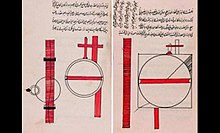Abū Bakr al-Karajī | |
|---|---|
 Diagrams from Al-Karaji's work on "hidden waters" | |
| Born | 953 |
| Died | 1029 (aged 75–76) |
| Nationality | Persian |
Main interests | Mathematics, Engineering |
Abū Bakr Muḥammad ibn al Ḥasan al-Karajī (Persian: ابو بکر محمد بن الحسن الکرجی; c. 953 – c. 1029) was a 10th-century Persian[2][3][4] mathematician and engineer who flourished at Baghdad. He was born in Karaj,[1] a city near Tehran. His three principal surviving works are mathematical: Al-Badi' fi'l-hisab (Wonderful on calculation), Al-Fakhri fi'l-jabr wa'l-muqabala (Glorious on algebra), and Al-Kafi fi'l-hisab (Sufficient on calculation).
- ^ a b PAZWASH, HORMOZ; MAVRIGIAN, GUS (1986). "The Contributions of Karaji—Successor to al-Khwarizmi". The Mathematics Teacher. 79 (7): 538–541. doi:10.5951/MT.79.7.0538. ISSN 0025-5769. JSTOR 27965055.
- ^ "Muhammad Al-Karaji: A Mathematician Engineer from the Early 11th Century | Muslim Heritage". www.muslimheritage.com. Retrieved 2018-08-10.
Of Persian origin, he spent an important part of his scientific life in Baghdad where he composed ground breaking mathematical books.
- ^ Selin, Helaine (2008). Encyclopaedia of the history of science, technology, and medicine in non-western cultures. Berlin New York: Springer. p. 131. ISBN 9781402049606.
Al-Karajī Abū Bakr Muh.ammad was a Persian mathematician and engineer.
- ^ Meri, Josef W. (January 2006). Medieval Islamic Civilization, Volume 1 An Encyclopedia. Routledge. p. 32. ISBN 978-0-415-96691-7.
During the tenth century CE, the Iranian mathematician al-Karaji (...)